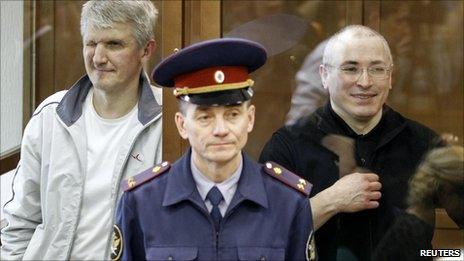Mikhail Khodorkovsky: Russian court upholds conviction
- Published

Mikhail Khodorkovsky (right) and Platon Lebedev were convicted together
A Moscow court has upheld ex-tycoon Mikhail Khodorkovsky's second conviction appeal for fraud but cut his 14-year sentence by one year.
Khodorkovsky was convicted in December of embezzling nearly $30bn (£19bn, 21bn euros) worth of his own company's oil and laundering the proceeds.
He had told the court his conviction, which extended his existing jail term by six years, was "absurd".
It appears he will not be eligible for release now until 2016.
The prosecution and imprisonment of Khodorkovsky, once Russia's richest man as owner of the energy giant Yukos, have been widely criticised outside Russia.
His fate has been seen by some as punishment for seeking to support a liberal opposition in Russian politics, and thereby challenging Vladimir Putin, the former president and current prime minister.
'Spitting on the law'
Questions over his conviction gathered new force in February, when the sentencing judge was accused of having changed his verdict, under external pressure.
Judge Viktor Danilkin denied the accusation, levelled by his court aide, Natalya Vasilyeva.
In a speech to the court on Tuesday, Khodorkovsky said "it was clear" the accusations against him and the sentence which had been handed down were "absurd".
He called on the three appeal court judges to throw out the case.
"Either overturn the sentence and put at end to this disgrace or you will join those criminals who spit on the law," Khodorkovsky said.
He was certain, he said, his fate was being decided outside the court and added that he would not seek clemency.
Appealing along with him is his business partner, Platon Lebedev.
Arrested in 2003, the two men were eventually sentenced to nine years' prison in 2005 for fraud and tax evasion, a term also later reduced by one year.
The new prison sentence handed down in December is running concurrently with the first term.
- Published30 December 2010
- Published24 February 2011